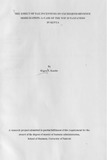The Effect of Tax Incentives on Exchequer Revenue Mobilization: a Case of the Top 25 Taxpayers in Kenya
| dc.contributor.author | Kigen, Kandie T | |
| dc.date.accessioned | 2016-05-16T08:13:27Z | |
| dc.date.available | 2016-05-16T08:13:27Z | |
| dc.date.issued | 2011 | |
| dc.identifier.uri | http://hdl.handle.net/11295/95687 | |
| dc.description.abstract | The objective of the research paper was to determine the effect of tax incentives on exchequer revenue mobilization with a special focus on the top twenty five taxpayers in Kenya. Taxation is an important tool of generating revenue for a country and countries have a right to impose taxation within its borders. In order to achieve the above objective, the study set out to investigate the utilization levels of tax incentives per taxpayer which are cost wise described as tax expenditure (TE) and determine how tax revenue is affected by tax incentives. The results from the study indicated that turnover and taxable income were independent oftax incentives and neither influenced the other. Tax incentives were established to account for 0.6% and 5% of the total GDP and actual tax revenues collected per annum respectively. The research noted that conclusions drawn from the study were subject to limitations such as reliability of accounting information and the fact that the study focused around high net worth firms who are the highest consumers of tax incentives. | en_US |
| dc.language.iso | en | en_US |
| dc.publisher | University of Nairobi | en_US |
| dc.rights | Attribution-NonCommercial-NoDerivs 3.0 United States | * |
| dc.rights.uri | http://creativecommons.org/licenses/by-nc-nd/3.0/us/ | * |
| dc.title | The Effect of Tax Incentives on Exchequer Revenue Mobilization: a Case of the Top 25 Taxpayers in Kenya | en_US |
| dc.type | Thesis | en_US |



